
Binance
Only for verified users
Discover the world of Bitcoin; learn how it works, how to buy Bitcoin, store it and even spend it with the complete guide to buying Bitcoin!

Only for verified users


Deciding to buy Bitcoin is a momentous step, and it should be celebrated with excitement, happiness, and joy.
That doesn’t mean that buying bitcoin is a simple ride for everyone, with the process requiring a basic understanding of how investments work.
So, to ease you into the world of buying Bitcoin, or to refresh the basics for those who are more seasoned, we’re going to walk you through the basics of Bitcoin, how you can buy Bitcoin and answer all the other questions you may have!
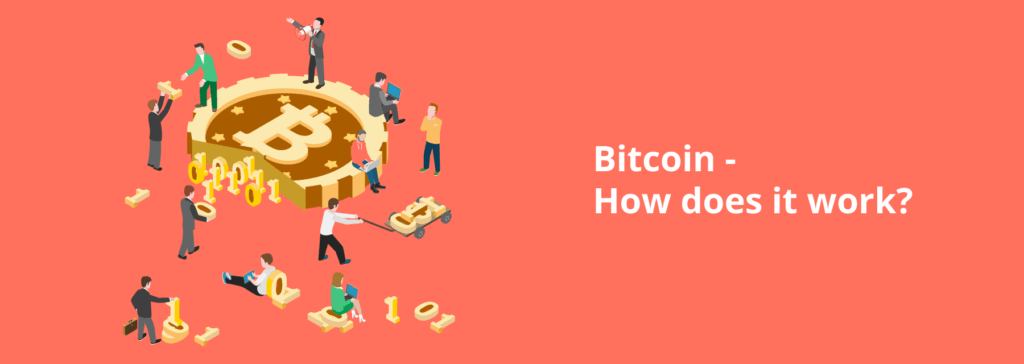
If you’re already adept in the ways of Bitcoin, feel free to skip this section.
But it never hurts to go back over the basics and refresh our knowledge, especially given that Bitcoin frequently updates and adds in new protocols.
Bitcoin is an electronic peer-to-peer currency, essentially magic internet money.
Bitcoin was launched back in January 2009, when Satoshi Nakamoto, the creator of Bitcoin, mined the first block, kick-starting what is now the largest cryptocurrency by market cap.
You can store Bitcoin in wallets and make transactions by entering in another wallet address and hitting send – very similar to making a bank transfer.
People known as miners work around the clock to pack transactions into a neat block using a unique hash in order to process blocks.
They use armies of powerful computer equipment to solve these puzzles and keep the network running.
Each Bitcoin block holds around 2,700 transactions, meaning that when there are lots of transactions being made, you could have to wait a little while.
A Bitcoin block is mined every 10 minutes, so if your transaction is 4,000th in the queue, you’ll be waiting for 20 minutes or so before you’re included in a block and your transaction is completed.
Bitcoin never expires and you can store it safely in your wallet for as long as you wish.
Simply move it to an exchange or broker and you can then swap it into any other cryptocurrency or fiat currency.
You can also opt to spend Bitcoin on goods and services from businesses that have embraced the digital age.

Once you have made the jump and and managed to buy Bitcoin, you can call yourself a Bitcoiner – welcome to the family!
Bitcoin has an incredible number of uses, ranging from a currency used to buy and sell goods, both physical and digital through to a store of value.
Many people opt to spend Bitcoin on goods and services, with some of the biggest names now accepting Bitcoin.
That being said, some businesses still aren’t ready to make the jump and accept Bitcoin.
To fix that, people have created apps that allow you to purchase gift cards and vouchers with your Bitcoin that you can then use at a business that doesn’t accept Bitcoin.
Bitrefil is one the most popular sites that allows you to live on crypto, without needing to cash out any of your Bitcoin.
You can buy cars, property, tech, food and much more, with the likes of Home Depot, Overstock, Microsoft and Starbucks all accepting Bitcoin.
Simply tell the cashier that you’d like to pay in Bitcoin, and they’ll generate a QR code for you to scan.
Pull out your mobile phone with a Bitcoin wallet installed and scan the QR code.
That’s it, you just paid for a new flat screen TV from Home Depot with your Bitcoin – how cool and effortless was that!

To really understand Bitcoin and why it’s such an important development for the world, we need to look at how it works.
All cryptocurrencies use a blockchain as their underlying database, powering them and ensuring that accurate and immutable records are kept.
People had tried to create digital currencies in the past, but they all failed at a single point – trust.
In applications where blockchain is not deployed, the database is controlled by a single person or entity.
This means that anyone with the power could take away your money or give themselves unlimited money.
Bitcoin solved this problem by using a blockchain.
Blockchain is a series of “blocks” all linked together.
Combined, they hold the entire history of every single transaction on that network.
The blockchain record is secured cryptographically using hashes and distributed across the globe by people running nodes.
The nodes store the full Bitcoin blockchain, so the more people running nodes, the more secure the network is and the less likely that a single person can alter the blockchain.
Simply put, a blockchain is a database that’s distributed to ensure no single point of failure or abuse.
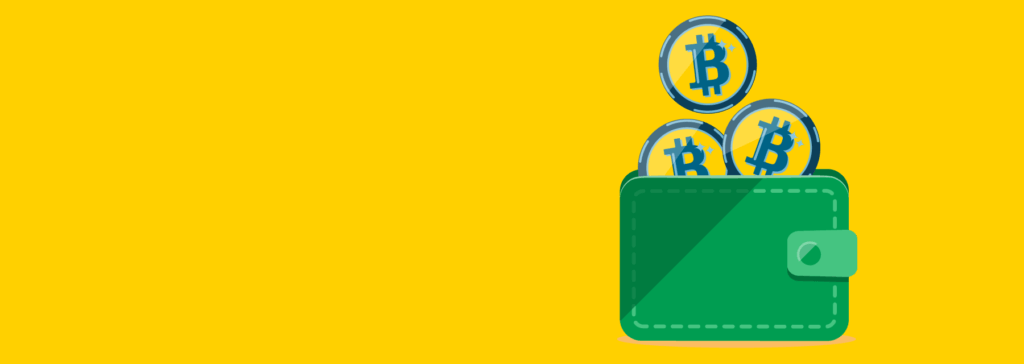
When you pull cash out of the ATM or want a safe way to carry around your bank cards, you tend to use a wallet.
The same goes for when you buy Bitcoin.
You can’t just stuff Bitcoin in your pocket due to the fact that it’s a digital currency, so you need to get your hands on a digital wallet.
Your digital wallet will allow you to send and receive Bitcoin, as well as other cryptocurrencies.
Each wallet will generate an address for you to receive Bitcoin.
Some wallets will even give you the power to create more than 1 Bitcoin address so that you don’t have to reuse addresses, which is ideal for privacy.
There are many different types of wallets on the market, but they all have the same function.
The easiest and simplest Bitcoin wallets are mobile phone wallets.
These are apps that you can download onto your iPhone or Android phone and use to create a wallet.
Some of the best mobile Bitcoin wallets are:
When you open the wallet app, yaou’ll be given a 12-word phrase, known as a seed phrase.
It’s important that you write this down in a safe place and don’t give it out to anyone.
You see, if you lose your phone, you can then open the same app on your new phone, type in those 12 words and your Bitcoin wallet will load on your new phone.
No lost Bitcoin!
If you’re after a bit more security, you can opt for a hardware wallet, such as a Ledger or a Trezor.
You should generally look to use a hardware wallet if you hold more than $1,000 worth of Bitcoin.
But that’s not a solid rule.
You can use a hardware wallet if you’ve only got $20 of Bitcoin – it’s up to you.
Then there are professional grade wallets that are incredibly secure.
If you’ve got enough Bitcoin, you can go to a company like BitGo or Trustology.
These guys work with institutions and high net worth individuals.
If you don’t have that kind of Bitcoin but you want that level of security, YetiCold is a great option with varying levels of security for you to pick from.
Before you buy Bitcoin, you can learn all about Bitcoin wallets with our guide to crypto wallets!

Bitcoin transactions come with all sorts of options and terminology thrown in, which can be a little confusing.
But there’s really no need to worry, as it’s incredibly simple and we’re going to walk you through it step by step.
First up, when you buy Bitcoin for the first time, you’ll likely be using a fiat currency at an exchange.
If you simply want to buy Bitcoin at whatever price, you just type into the exchange how much you want to buy and pick market order.
Market order will submit your order to the exchange at the market price, filling your buy order almost instantly.
You can opt to buy at a specific price by using limit orders, but these are more complicated, and you should only use them if you’ve got trading experience.
For this purchase, the exchange will instantly move Bitcoin into your exchange wallet.
You won’t need to put in any information as the exchange knows which wallet is yours.
The other type of transaction that you can make is sending your Bitcoin between two wallets.
When doing this, you’ll need to have the other wallet address to hand.
You will then go to the send function in the wallet or exchange application and paste or type in the wallet address you wish to send Bitcoin to.
If you opt to paste, have a quick read through the address and make sure that it matches up with the actual wallet address.
It takes a couple of seconds to verify the address is correct, and you protect yourself from human or technical errors.
After all, once you hit send, you can never reverse that transaction.
Once you’re happy with the address, select the amount you wish to send.
If you want to send the complete balance of your wallet, you can usually press a button that says “max” to automatically fill in this section.
Some wallets will let you select the fees, which is a handy feature.
Turning the fees down to low will save you money, but the transaction will take longer to be included in a block.
This is due to the fact that miners pick which transactions they include in blocks, and it’s more profitable for them to include the transactions with higher fees.
You can then opt for standard or high fees.
Using high fees will usually guarantee that your transaction is in the next block and is recommended for urgent transactions.
Once you’re happy with everything, you can hit send and your transaction will go off to the transaction pool.
This is known as the mempool and it’s where all the transactions wait before being added to the next block by the miners.
Once your transaction has made it into a block, you’ll see 1/6 confirmations in the receiving wallet.
This is a security feature to ensure that the Bitcoin can’t be double spent during the processing time.
Depending on the amount you’re trying to send, and the wallet being used, this number of confirmations will vary.
A confirmation is simply how many blocks have passed since your transaction was included.
Simply put, 6 confirmations is the same as 6 blocks, meaning that it will take around 1 hour for your transaction to be considered valid and spendable in the receiving wallet.

When you’re sending or receiving Bitcoin, you’ll need to input or give a Bitcoin address.
Think of a Bitcoin address like your home address.
Your home address is where you live, and your Bitcoin address is the wallet where your Bitcoin lives.
Your wallet address is unique to you and can never be generated again by anyone else.
If we compare sending Bitcoin to sending a parcel across the globe, it might be a little easier to understand.
You start off by making sure all the details are correct, such as amount, address and picking the speed at which it will be delivered.
You then call UPS to come pick up the parcel.
With Bitcoin, this is you hitting send on the transaction.
Then UPS/the miners will take over the transaction, feeding it through their magic systems and processes.
Then, if you got the address correct, the Bitcoin and parcel will arrive at its destination.
The only difference is that with Bitcoin there’s no delivery guy to call you if he can’t find your address.
In this case, the Bitcoin will be lost forever and considered burnt.
This is why triple checking the address is correct before sending is so important.
Some wallets will automatically check to ensure that the address is valid before sending.
But not all wallets come with this feature – so be careful.
A handful of wallets give you the option to create multiple addresses for the same wallet.
This gives you the power to give out a different address to scores of different people.
All the while receiving the Bitcoin in the same wallet.
This boosts your privacy and keeps you more secure in the long run.
You can also opt to use the same Bitcoin address repeatedly.
Nothing bad will happen if you do this.
Some people just prefer to be a little more private, especially when they have large sums of Bitcoin in their wallets.
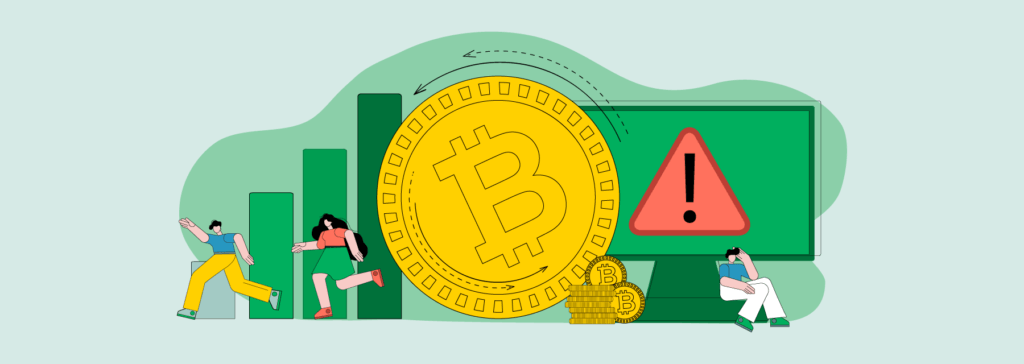
As with anything, there are risks when you buy Bitcoin.
Whether its loss from price fluctuations, being targeted in a theft attempt or having your personal data leaked, the Bitcoin world is still risky.
You can take steps to mitigate the risks that you expose yourself to.
But it’s still not a silver bullet, with the unexpected happening daily.
For example, people who opted to keep their Bitcoin as safe as possible purchased a Ledger hardware wallet.
Ledger then got hacked and leaked email addresses, mailing addresses, phone numbers and full names of their customers.
So, even if you take all the right steps, one mistake that’s out of your control can put you at risk.
However, if you’re sensible and make smart choices, you can go decades without running into any troubles with Bitcoin.
It’s the luck of the draw, but you should still look to keep yourself as safe as possible.

Many countries have either created some form of regulations around Bitcoin or are looking to put them in place.
Others, however, are still undecided on whether Bitcoin is legal or not.
These countries yoyo between legal and illegal on a semi-annual basis, with China and India being the biggest culprits.
Bitcoin is legal and legitimate as a currency or investment vehicle in virtually all other countries.
Islamic scholars are still on the fence, with some calling it haram and some calling it halal.
If you are a Muslim and are unsure, it’s always best to have a conversation with your imam to get their take.
For others in the western world, Bitcoin is well regulated and accepted.
Most European countries have welcomed Bitcoin with open arms, creating laws and tax rules for this new asset class.
In North America, it’s a prosperous and legal asset class.
Provinces in Canada have even begun accepting Bitcoin for tax payments, highlighting just how crypto-friendly they are.
The following countries have blanket bans in Bitcoin:
Other countries have adopted partial bans on Bitcoin.
These bans include banking bans and bans for using Bitcoin as a method of payment.
A banking ban means that you cannot buy Bitcoin with your debit or credit card issued in that country.
These countries have a partial ban on Bitcoin:
Since Bitcoin rose to fame back in 2016, it has become easier and easier to buy Bitcoin.
There are now hundreds of exchanges, Bitcoin ATMs, and meetups all over the world, giving people quick and easy access to buy Bitcoin.

But, as Bitcoin became easier to buy, the scammers and thieves out there decided it’s time to join in.
Crypto exchanges have been known to close overnight, taking user funds with them.
If a hot wallet gets hacked or the CEO suddenly dies, you could lose everything.
This has happened many times in Bitcoin’s life, with Mt. Gox being one of the biggest cases to date.
More recently, Quadriga CX, a Canadian crypto exchange, found its wallets empty after its founder Gerald Cotton died.
People that decided buy Bitcoin and store it on the exchange lost everything, with an investigation still rolling on 3 years later.
Other possible dangers when you buy Bitcoin, include fake exchanges.
Fake exchanges will let you deposit a fiat currency and buy Bitcoin, but you can never withdraw it.
Suddenly you can’t exchange back to fiat or withdraw your money.
Peer-to-peer meetups have also gone south quickly, with people getting murdered.
A 24-year-old from Oslo, Norway was murdered after a cash for Bitcoin deal went wrong.
There are so many risks to consider when you buy Bitcoin, so it’s best to stick to a reputable exchange or broker service, especially if you want to just invest in Bitcoin.
If you stick to reputable brokers when you invest in Bitcoin, then there are a lot less things that can go wrong, making the decision to invest in Bitcoin perfectly safe and secure.

With Bitcoin being a digital currency, you are at risk of being hacked.
But, the chances of this happening are remote, if you use best security practices.
Americans have reported cases of sim swapping.
This is the technique where a hacker calls up a telecom company and manages to get a new sim card with your number sent to them.
They then use this sim to access your 2-factor authentication (2FA) codes and then into your crypto wallets.
Once they’re in, they siphon off all your Bitcoin and repeat the attack on another innocent soul.
Another way you can get hacked is by revealing your 12-word seed phrase, allowing someone to restore your Bitcoin wallet.
If that’s not scary enough, fake wallet applications will instantly send your Bitcoin to the hacker’s wallet.
Other hackers have resorted to creating malware that changes Bitcoin wallet addresses that you paste.
This makes triple checking the address when you paste it critical.
Finally, weak passwords and passwords that have been used on many sites by the same person are another hacker’s favorite.
All of these are simple ways for hackers to steal your Bitcoin.
But, if you use a 2FA app such as Google Authenticator or Authy, you can cut down the risks significantly.
Also, you should be using a unique password for every site.
Consider an app like LastPass to generate and manage these for you.
Finally, don’t click on any suspicious links in emails or SMS messages.
If you doubt everything and have a healthy skepticism of the world, you can avoid all these potential issues.
The more effort you put into being secure, the less likely you are to get hacked and have your Bitcoin stolen.
Follow these top security tips and you’ll be as secure as you possible can be:
You can also read our guide to the best crypto security tips!
The process to buy Bitcoin is getting easier with every passing week.
But this opens a world of options, with some being a little more expensive than others.
The fees and spread, which is the difference between the buy and sell price, usually equates to the convenience and privacy of the method.
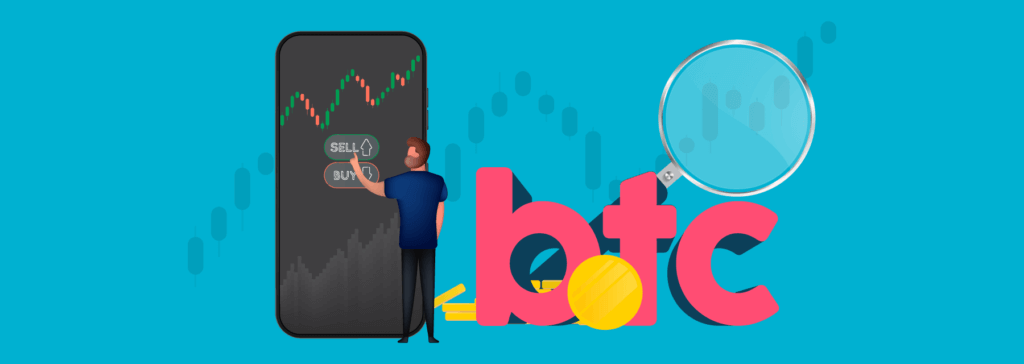
A rule of thumb to follow is the higher the fees and the wider the spread, the easier it is to use and the more private it is.
This isn’t true globally but is true for most of the ways that you can invest in Bitcoin.
For example, most Bitcoin ATMs have very lax KYC and high limits.
But you’ll end up paying around 15% on that transaction.
When you’ve found where you want to buy Bitcoin, all you have to do is fund your account.
You can usually deposit using your credit or debit card, PayPal, or by making a bank transfer.
Every region will have its own payment methods, so look for exchanges and brokers that support your favorite payment methods and allow you to buy Bitcoin.
Once your account is funded, and KYC completed if it’s required, you can go ahead and buy Bitcoin.
Interfaces are different on every exchange, ranging from simple click and buy Bitcoin to advanced trading tools.
If you want to invest in Bitcoin at the current price, you’ll want to make a market order, which is the default setting on most exchanges.
Simply put in the amount you wish to buy and hit buy Bitcoin.
Once the order is accepted by the exchange, the fiat money will be debited from your account and the Bitcoin added.
The most popular exchanges by 24-hour trade volume are as follows:
All of these exchanges are fairly similar, with competitive fees and ranges of cryptos that you can buy Bitcoin, sell Bitcoin and trade Bitcoin.
As we mentioned, there are many ways to buy Bitcoin, sell Bitcoin and trade Bitcoin.
We’re going to run through all the ways that you can do this, giving you a clear understanding of each method so you can pick the best method for you.
Aside from Atomic Swaps, the only way you can trade Bitcoin into another cryptocurrency is by using a crypto exchange or broker.
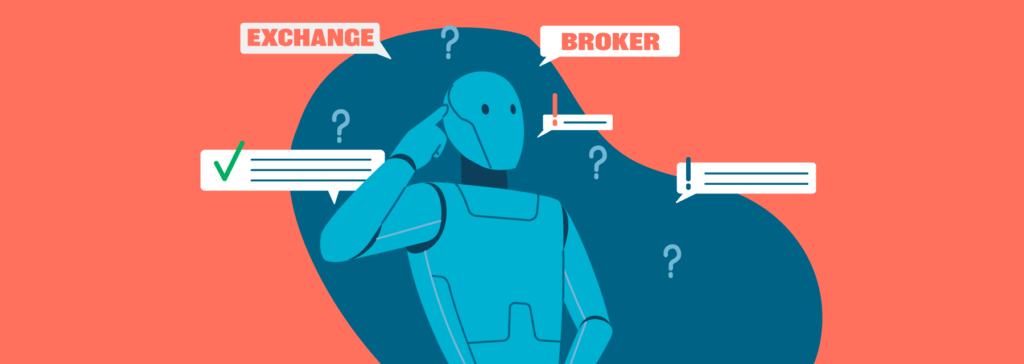
The simplest way to buy Bitcoin, sell Bitcoin and trade Bitcoin is by using a broker or exchange.
These companies cater specifically to people that are looking to buy Bitcoin, sell Bitcoin and trade Bitcoin, meaning they’ve got all the features you need.
You can fund your broker or exchange account using your debit card, credit card or bank transfer.
Some will even let you use other payment methods such as PayPal, Klarna and Skrill.
Once your account is verified and your fiat deposit has been credited to your account, you’re good to go.
The best exchanges will allow you to withdraw your Bitcoin.
If an exchange doesn’t offer this, then avoid using it as the chances are it’s not real Bitcoin, being a contract for difference (CFD) instead.
CFDs are financial instruments traded on stock exchanges.
They represent the value of Bitcoin, rather than actually being Bitcoin that you can move to your own wallet and spend.
If you’re looking to buy Bitcoin to use as currency, then a CFD is not the right choice.
However, if you simply want to invest in Bitcoin without the fuss and hassle of creating an account with an exchange, then a CFD is a great way to go.
These are not good and cannot be used like Bitcoin.
It’s simply a contract linked to the price of Bitcoin.
If you’re already signed up with a stockbroker, you might notice that they’re offering you the power to buy Bitcoin or invest in Bitcoin.
The great part of this is that you already know the company, trust them and they’re likely licensed.
But what they’re peddling isn’t actually Bitcoin, it’s a CFD.
Now, not everyone will want to withdraw Bitcoin from their wallet and is happy to just invest in Bitcoin and keep it that way.
For these purposes, a CFD is a great option.
You remove all the stress, fear and worry of being hacked or having your Bitcoin stolen.
If you opt for a CFD, it will remain on your trading account, and you won’t be able to withdraw it to your Bitcoin wallet.
Many people scoff at Bitcoin CFDs because of this, calling it fake Bitcoin.
But it serves a purpose and is great for people looking to get exposure to Bitcoin without the added stress.
It’s worth noting that the United Kingdom (UK) has banned all crypto CFDs to retail investors.
This means that UK residents cannot legally hold a Bitcoin CFD in their portfolio.
Hold onto your hats, we’re going to get a little financial with you here.
But don’t worry, we’ll explain everything, so you’ll sound like the Wolf of Wall Street when you talk about this with your friends, family, and co-workers!
If you want to invest in Bitcoin, these are the best products for you!
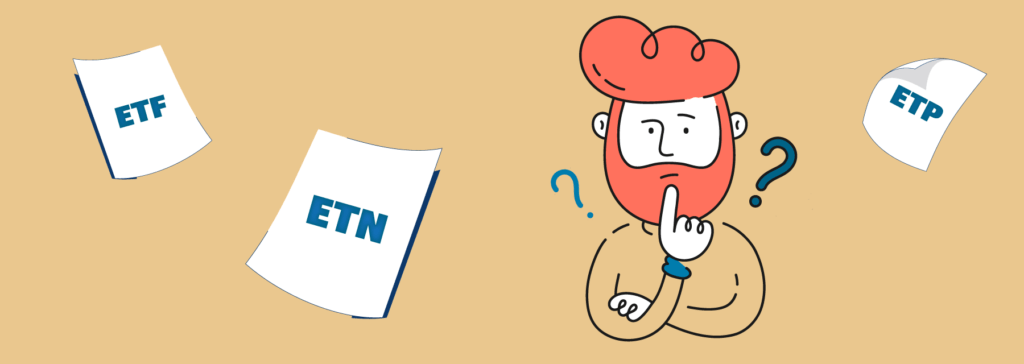
Financial institutions in the USA have been trying to create an exchange traded fund (ETF) for several years now.
However, the US Securities and Exchange Commission (SEC) has repeatedly shot them down.
A Bitcoin ETF is a security that tracks the index price of Bitcoin, but trades on the stock market – just like Apple or Tesla.
The Canadians have been a bit more forward thinking and gave a Bitcoin ETF the green light back in February 2021.
Purpose Investments provides the ETF, and it trades on the Toronto Stock Exchange under the ticker BTCC.
In Europe, there has been a Bitcoin exchange traded note (ETN) for a number of years now.
Both the Bitcoin ETN from XBT Provider and VenEck Vectors Bitcoin ETN are unavailable to American investors
Without getting technical, an ETN is an unsecured debt security.
This means that XBT Provider or VanEck are selling you the debt of 1 Bitcoin.
You then own that debt, which changes in value based on Bitcoin’s performance.
If Bitcoin goes up, so too does the value of your portfolio, and if it goes down, so too does your portfolio.
Finally, we come to Bitcoin exchange traded products (ETP).
An ETP functions in a very similar way to an ETF, so don’t get too caught up on the technical aspects and definitions.
ETC Group’s ETP, BTCetc launched on June 7 2021 in the UK on the Aquis Exchange.
Again, this ETP tracks the price of Bitcoin, giving institutional investors a way to invest in Bitcoin in a safe and regulated way.
This means investment portfolios and pension schemes can invest in Bitcoin.
While these financial products all have different names, they all work very similarly.
They all track the price of Bitcoin, with you making money when the value of Bitcoin rises.
Just like CFDs, they’re not real Bitcoin and only track the value of it.
This means that you cannot withdraw it to your own Bitcoin wallet or spend it.
They’re ideal for investors looking to gain exposure to Bitcoin without the faff and stress of using a Bitcoin exchange.
If you want to buy Bitcoin without needing to submit personal documents and completing KYC, then a Bitcoin ATM will be your best friend.
These machines are dotted around the globe, in some of the busiest and most popular cities on the planet.
You simply feed the machine with cash, scan your wallet’s QR code and the Bitcoin is there within an hour or so.
It’s incredibly quick, simple, and easy to use a Bitcoin ATM.
Best of all, there’s no invasion of privacy if you buy small amounts of Bitcoin at a time.
However, the fees for using a Bitcoin ATM can be very high.
Some start at 9% and there are some charging more than 35% for the pleasure of using an ATM.
If you’re looking to avoid the tax man, paying a 25% fee is cheaper than paying 30% or more in tax.
They can also involve a lot of traveling as they’re not quite in every town or city just yet.
You can check out Bitcoin ATM maps to see where your nearest ATM is before you opt for this method.
Obviously, this is a very inconvenient way to buy Bitcoin and sell Bitcoin, especially as most ATMs will be shut during periods of the day.
Finally, we come down to the wonderful world of peer-to-peer (P2P) Bitcoin trading.
Simply put, you arrange with a stranger to either buy Bitcoin or sell Bitcoin.
A price is agreed upon and then the transfer happens.
This is more often than not done online through P2P trading sites, such as LocalBitcoins and Paxful.
You can opt to meet a person in real life, and buy Bitcoin for cash.
But this has gone wrong many times, with a Norwegian recently getting killed at a P2P Bitcoin deal.
It’s safer to use a P2P exchange like LocalBitcoins or Paxful as they act as the middleman.
They will hold the Bitcoin and fiat currency until the other party has completed their end of the bargain.
The funds are then released when all parties are happy with the deal.
When done like this, P2P Bitcoin trading can be safe, fun, and low-cost.
Just as there are so many different ways that you can buy Bitcoin, there are also lots of ways that you can pay for Bitcoin.
Each method has its own pros and cons, and some are even outlawed in certain regions.
Let’s run you through the different ways you can pay when you buy Bitcoin or invest in Bitcoin.
The simplest, fastest, and cheapest way to buy Bitcoin is with your debit or credit card.

If you’ve got a card that gives you reward points for spending, then using this payment method is a double win.
You get to buy Bitcoin and a pile of reward points – result!
Virtually all exchanges and brokers accept cards, so you can quickly pop in your details and make a deposit.
Card payments are almost always instant, so you can pull the trigger on that buy Bitcoin order right away.
You’re also protected against unscrupulous exchanges with buyer protection and can request a chargeback if the exchange or broker stiffs you.
However, there are quite a few jurisdictions that ban debit or credit card payments where Bitcoin is legal, including:
It’s also worth keeping in mind that borrowing money to buy Bitcoin is a bad idea.
So, the use of credit cards is advised against in many places.
Bitcoin can rise in value, but it can also fall, giving you negative equity and monthly repayments that won’t wait.
Only trade with what you can afford to lose.
If you’re going to invest in Bitcoin through an ETF, ETN, ETP then you’ll likely opt for a bank transfer.
It’s the payment method of choice for traditional stockbroker platforms owing to the low cost and additional security.
Crypto exchanges with a fiat deposit option will allow you to make a bank transfer.
Bank transfers will have the lowest fees of any deposit method.
But you will have to wait up to 3 days for the deposit to be processed.
This can be frustrating if you’re in a rush to buy Bitcoin or invest in Bitcoin.
Bank transfers back to your bank from the exchange are also very cheap to make, costing the lowest fees.
Again, there is the time involved, but 3 working days isn’t a deal breaker.
If there’s a banking ban in the country you reside in, then you won’t be able to use a bank transfer.
It’s also worth noting that some banks have an anti-Bitcoin stance and will decline the transfer.
If this happens, you’ll need to try out one of the other methods we’re touching on.
Skrill is a major player in the money transfer market, predominantly used for sending fiat funds overseas.
Users can deposit to their Skrill account and then use their Skrill account to deposit at Bitcoin exchanges.
You can also buy and sell Bitcoin directly through Skrill, giving it an edge over some of its competitors.
It’s a safe platform to use and allows you to skirt around banking bans.
It’s free to put money in your Skrill account but exchanges will have varying fees for using this payment method.
Lorenzo Pellegrino, the CEO of Skrill, NETELLER and Paysafe, is pro-crypto.
This means you won’t have to worry about it stopping your deposits.
PayPal rose to crypto infamy at the back end of 2020.
It announced that it was going to allow users to buy and sell Bitcoin in-app.
It then added that merchants would be able to accept Bitcoin, making it a popular app with crypto lovers.
However, it’s not a fully-fledged crypto trading app, so it’s best used as a payment app.
A good deal of crypto exchanges will allow you to deposit using PayPal.
More and more are adopting PayPal every day, so you have a good range of exchanges to pick from.
Best of all, PayPal also allows you to circumvent banking banks.
If you’re looking to make a deposit at a European crypto exchange or broker, Trustly might appear as an option.
It’s a solid, quick, and reliable payment gateway that doesn’t require you as a user to create an account.
You simply pop in your card details and Trustly will process the payment.
The fees are rock bottom, and it allows you to circumvent any bank bans when you buy Bitcoin or invest in Bitcoin.
While there are no European countries that openly have a bank ban, many banks are anti-Bitcoin.
For example, in Malta, the “blockchain island”, several local banks prohibit transfers to crypto exchanges.
So, exchanges using Trustly are the go-to for people in this situation.
If your bank is anti-Bitcoin, keep an eye out for exchanges using Trustly.
Finally, we arrive at the cash alternative for when you want to buy Bitcoin.
While you cannot use cash to deposit at online exchanges, you can use it elsewhere.
You can use cash to buy Bitcoin from Bitcoin ATMs and at P2P meetups.
It’s the perfect choice for those looking to lay low and scoot under the radar of the tax man or the prying eyes of the bank – or wife for that matter.
There’s usually a maximum limit on how much cash you can deposit at a Bitcoin ATM.

So, do check deposit limits with the ATM provider before you make the trip.
Alternatively, if you’re heading to a P2P meetup, you might want to have a friend come with you.
Give your friend the bulk of the cash and get them to wait around the corner.
If things go south, most of the cash will be safe and secure.
Dealing in cash is always risky as there’s no trail should it get stolen, or the other member of the trade could choose to not honor the deal.
When you buy Bitcoin, you’re either going to end up with tangible Bitcoin that you can spend, or a security that tracks the value.
Both have their pros and cons, meaning that one isn’t necessarily better than the other.
It all depends on what you wish to do with the Bitcoin you buy and how worried you are about losing it.
When you buy Bitcoin from an exchange, an ATM or through a P2P service, you’re going to be buying the real deal.
This is real Bitcoin that you can move between wallets, make transactions with, and record your life on the blockchain.
For this Bitcoin, you will need to have your own wallet and send it to your address.
It does come with security concerns and issues, though.
You can lose all your Bitcoin by sending it to the wrong address or even have it stolen if you’re careless with your personal security.
At the end of the day, this is the real deal and is the best if you’re after financial freedom.
You can use this Bitcoin just as you would a currency.
Spend it in shops, at businesses and at crypto gambling sites.
The freedom is yours!
If you are just starting with Bitcoin, or you just want to invest in Bitcoin, then buying from a stockbroker is a great idea.
Most stockbrokers will have listed at least one of the various ETN, ETP or ETFs.
So, you’ll be able to log in to your account with the broker that you already know, use and trust, adding it to your portfolio in seconds.
It’s the same process as adding any other equity, bond, or security to your account.
Just search up the security you wish to add, insert the amount, and press buy.
You’ll now have exposure to Bitcoin’s price movement in your portfolio.
If you are hoping to spend your Bitcoin on goods, services and experiences, this Bitcoin isn’t for you.
It’s simply a bit of paper that says you own X amount of exposure to Bitcoin.
Not the actual Bitcoin itself.
This does come with a few perks, though.
If you don’t care for creating an account at a cryptocurrency exchange or want to deal with the stress, then your stockbroker is a great option.
Nobody can hack you.
You don’t have to worry about sending your Bitcoin to the wrong address and losing everything.
You don’t have any of that extra stress.
Just buy Bitcoin, invest in Bitcoin and sell exposure to Bitcoin from the comfort of a brand you know and trust.
If you buy Bitcoin and it goes up in value, then you are liable to pay tax on it in many jurisdictions.
There are a few exceptions to the rule, but for the most part, Bitcoin is treated just like a regular financial instrument.
This means it’s subjected to capital gains tax laws.
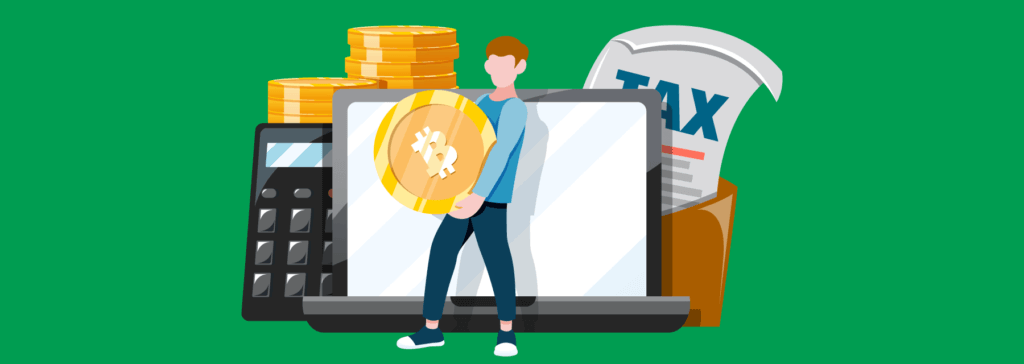
The one perk of this is that when you make a loss, you can deduct it from your tax bill.
This is where trading Bitcoin through your stockbroker account is a huge advantage.
These platforms are already built with tax reporting systems in place, making filing your taxes incredibly simple.
You’ll do the same thing that you, or your accountant, usually does – no extra fuss.
However, if you’re trading with a cryptocurrency exchange, then you need to keep track yourself.
You need to note down every single transaction you make, as these are all taxable events.
If you’re buying a coffee, paying your phone bill, or simply trading back into your fiat currency – these are taxable events.
You must keep track of every single event and report this to the tax man at the end of the financial year.
A lot of jurisdictions understand that Bitcoin is still very new, so they are a bit more lenient with estimates.
But eventually they will stop being so lenient and they will look into every transaction you make.
There are great apps out there that you can connect your wallets to, calculating your tax for you as you go.
The best Bitcoin tax apps are:
Simply share your wallet information and exchange accounts and these apps will help you calculate your tax bill.
If used correctly, you could end up saving a good chunk on your tax bill.
Making them worth their weight in digital gold!
Australia, Germany, and Malta all reduce the tax payable on Bitcoin to $0 if you hold for a long period of time.
That means if you buy Bitcoin and then sell it a year later at a profit, you aren’t required to pay any taxes.
This is done to incentivize long term ownership, rather than day trading this highly volatile asset class.
On the other hand, there are many countries that simply don’t charge any tax, for one reason or another.
The following countries don’t demand that you pay tax on your Bitcoin:
It’s always worth triple checking with a cryptocurrency tax expert in your region if you’re unsure.
Tax laws do change from time to time, so don’t be afraid to ask for help.
It’s better to err on the side of caution.
You can learn more about taxes on Bitcoin with our crypto tax guide!
Calculating the taxes that you owe on Bitcoin is another ballgame.
Unless you live in a jurisdiction that doesn’t tax Bitcoin, then you’re going to have to do some math.
As we mentioned earlier, there are lots of great apps that you can use to calculate your taxes for you.
This is by far the best option as then you can be sure there are no errors or missing taxable events.
If you trade Bitcoin using a stockbroker, then the stockbroker platform will produce a sheet with your payable capital gains.
If you want to do it all manually, that’s fine too.
You must record every trade and transaction that you make with Bitcoin.
That could be a coffee, a quick trade to a fiat currency, or a dinner.
It’s a lot of work and missing a single transaction could land you in hot water.
A lot of people don’t do this or report their Bitcoin taxes.
For the most part, these people have largely been left alone.
Especially for those that aren’t trading millions of dollars of Bitcoin.
But it’s always recommended to do your part and do the right thing.
If you opt to not pay the taxes due for your Bitcoin gains, you could be looking at a huge fine.
Some jurisdictions might also throw you in jail.
The best way to go when it comes to crypto tax is to use an app to do all the hard work for you.
They populate all the information automatically and tell you which boxes to fill in on your tax return at the end of the year.
In case you missed it, these are the best cryptocurrency tax applications:
If you don’t mind keeping records manually, you can always enlist the help of a crypto tax specialist.
These guys know all the ins and outs of the crypto tax world.
They could also save you more than their cost by using creative accounting.
Whichever route you take, it’s best to pay your crypto taxes.
At least you’ll be able to sleep at night.
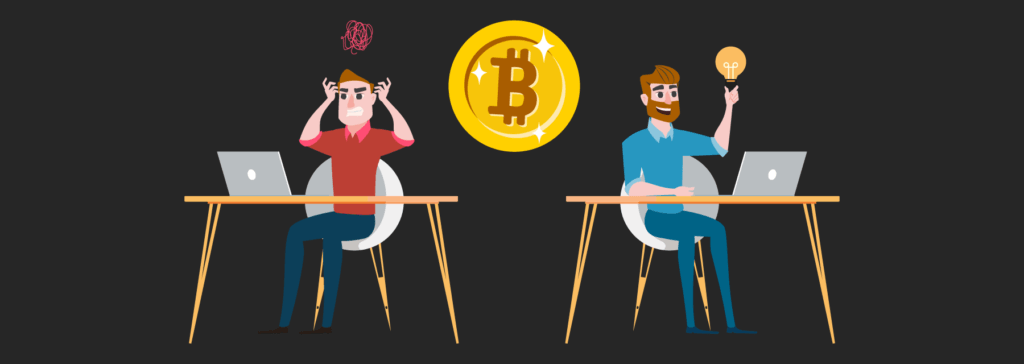
Bitcoin was designed as a digital currency built for a modern world.
But that hasn’t stopped it skyrocketing in value and becoming the hottest investment vehicle the world has ever seen.
It goes through cyclic patterns of bull and bear markets, allowing investors to make a solid income.
As an investment, Bitcoin has outperformed every other asset class since it launched in 2009.
This makes it hot property and gives it the power to command such a high price.
Whether you buy Bitcoin through an exchange and hold the actual coins in your very own wallet, or invest in Bitcoin through a stockbroker, you’re still investing wisely.
If you sell your Bitcoin at a higher price than when you bought it, you can make good money.
For example, in 2019 you could pick up Bitcoin for $4,000 at a point.
Today, Bitcoin is worth more than $35,000.
So, if you held Bitcoin in your portfolio for that period, you’d be making a massive profit.
But it doesn’t always go that way.
In December 2017, Bitcoin was trading at $19,000.
People that decided to buy Bitcoin at that price had to watch it fall back down to $3,500 before it would climb up in price.
Bitcoin pays out the most money to long-term investors.
If you’re looking to get rich quick, Bitcoin isn’t the answer.
If you’re looking for a high-risk asset to invest in that has great potential to deliver high returns over the long-run, Bitcoin is a great choice.
The money you make is the same whether you use a stockbroker or a crypto exchange.
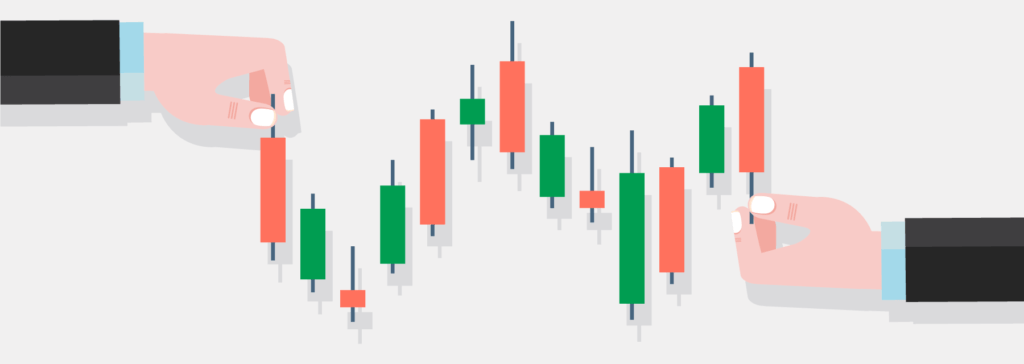
The most attractive quality of Bitcoin is its high volatility.
It has made thousands of multi-millionaires, and people want a slice of that life.
Bitcoin is changing the world we live in and the way we interact with it.
But this comes with its disadvantages.
The cryptocurrency world is still largely unregulated, meaning that a single person can crash the market at will.
We’ve seen miners offload huge piles of Bitcoin, crashing the market in seconds.
In traditional finance, this would be illegal and dubbed market manipulation.
The very same thing Elon Musk got in trouble for with Tesla.
These big traders, known as whales, should be using OTC desks.
Combine this with a lack of education of a lot of Bitcoin investors and one slight dip of 10% can suddenly become a 40% drop.
But this makes it more exciting, promising huge gains to those that play the game.
Due to being such a new asset class and industry, Bitcoin experiences these wild swings on a near daily basis.
In traditional finance, a 10% price movement in a day is unheard of.
But in Bitcoin, that’s a regular Monday morning.
If you’re going to invest in Bitcoin, be aware that the volatility cuts both ways.
You can make a lot in a short period of time, if you catch the beginning of a pump.
But you can also lose a lot if you’re stuck in a market dump.
If your portfolio is in the red, the best action plan is to wait it out.
Bitcoin and it’s volatility has always come back to repay investors and those with patience.

If you buy Bitcoin using a CFD, you will have the option to trade with leverage.
This means that you can get more exposure to Bitcoin than your account balance would normally allow.
For example, if you buy Bitcoin with a 2x leverage and your balance is $100, you’ll get $200 worth of exposure to Bitcoin.
If the value of Bitcoin increases, you can cash out your position and walk away with 2x profit.
However, if Bitcoin falls in price, you will get closed out of your position once the value of the trade goes below your balance.
This is known as liquidation.
When trading Bitcoin CFDs, you can also make a bet that Bitcoin will drop in price.
This is known as a short.
The same rules apply to shorting as they do to buying Bitcoin on leverage, which is also known as a call.
If the price rises beyond your balance value, then you’ll get liquidated.
On the other hand, if the price falls you can close your position and walk away with the price difference as your profit.
Several crypto exchanges offer leverage trading with actual Bitcoin, rather than CFDs.
These exchanges also offer leverage up to 100x, which is a wild amount considering how volatile Bitcoin is.
To put it into comparison, the European Securities and Markets Authority (ESMA) limits Bitcoin leverage trading to 1x.
It also suggests that stockbrokers offering Bitcoin leverage trading suspend the feature during periods of high volatility.
Trading Bitcoin on leverage is a very dangerous game to play, as the wild movements can be sudden.
It’s very easy to get liquidated and lose a lot of money.
So, trade Bitcoin on leverage with care.
You may have heard of day trading before.
It’s essentially where you open and close positions in various stocks throughout a single day.
It can be a profitable way to trade, especially if you have the time to dedicate to it, and a keen eye for market movement.
Just as you can day trade stocks and other traditional financial instruments, you can day trade Bitcoin.
Day trading Bitcoin can be incredibly lucrative thanks to the huge price swings it sees every day.
A 10% swing before lunchtime is not uncommon.
If you’re got the time and patience to day trade Bitcoin, you can capitalize on this volatility.
The main goal of day trading Bitcoin is to take advantage of small price movements to generate a net profit.
Even if you buy a $100 dip and sell it when it climbs back upwards $120, you’re in the green.
The idea is to do this with big chunks of money.
This gives you the most profitability from these small movements.
Bitcoin day traders tend to follow either the hourly or 5-minute charts.
However, if you’re not experienced in day trading, it can become easy to start following your heart and end up losing vast sums.
Set limits and targets, walking away when either one of these conditions are met.
For example, if you start with a balance of $10,000, you will walk away if your balance reaches $7,000 or $13,000.
This prevents tilting and chasing losses or getting too greedy and losing your profits.
Bitcoin has yielded incredible returns to investors over the years.
But the investors who reap the biggest rewards are the ones who held their investments for a long period of time.
Bitcoin goes through 2 cycles, a bull and bear cycle.
The bearish cycle, where Bitcoin largely drops in price, lasts around 3 to 4 years on average.
The bullish cycle lasts between 1 and 2 years.
So, even if you buy at the top of the bull market, history suggests that you’ll make your money back if you wait out the next bear cycle.
For example, those that bought Bitcoin at the top back in 2017 still made a profit if they held on until early 2021.
In fact, they more than doubled their money.
So, if history is anything to go by, fortune and Bitcoin favors the long-term investors.
Don’t forget that several jurisdictions reward you for holding long-term.
Australia, Germany, and Malta all slash the payable taxes on Bitcoin down to $0 if held for a year or more.
That means not only are you likely to win big by backing Bitcoin long-term, but you’re also going to win against the tax man too!
That’s a double victory that puts more money in your pocket!
Soon people will think you’re George Soros or Warren Buffet if you keep making smart investment decisions like that.
Bitcoin is the big daddy of the crypto world.
Without Satoshi Nakamoto and Bitcoin, the blockchain and cryptocurrency world would not exist.
This gives Bitcoin a pedigree that can’t be taken away, even if Bitcoin isn’t the best.
Bitcoin is like a vintage car and will continue to age like one.
Even though Bitcoin is slow, is expensive to use and has very few practical use cases, it will live forever.
It will eventually move into the hands of private collectors and long-term holders that are using it as a stable store of value.
Once the speculators all move on to pastures new, Bitcoin’s price will settle down, making it an incredibly attractive digital alternative to gold.
Sure, it might not have the speed of Stellar or Ripple.
It might not have the utility of Ethereum or Binance Smart Chain.
But it was never meant to.
Bitcoin was a gift to the world from Satoshi Nakamoto that has helped humans advance in the technological world.
Everyone on the planet has heard of Bitcoin, and this gives it a longevity that will see it outlive 90% of the altcoins that are presently active.
This in turn makes Bitcoin a great long-term investment and store of value.
Treat Bitcoin like you would your elders – with respect.
Bitcoin came to life back in 2009 when Satoshi Nakamoto mined the first block.
The first block included a note that had an excerpt from The Times and it read “The Times Jan/03/2009 Chancellor on brink of second bailout for banks”
The first block reward was worth 50 Bitcoin.
Satoshi was a mining visionary, using powerful and incredible technology that the mining world still hasn’t figured out more than 21 years later.
He was the dominant miner for several months thanks to this mining algorithm, allowing him to pocket a small fortune.
In the first year, Bitcoin was worth virtually nothing, owing to the tiny userbase and lack of awareness.
Then, in February 2011, it soared in value and became worth $1.
The year 2013 was another stellar year for Bitcoin, as it climbed to the lofty height of $1,242.
However, it wasn’t meant to last.
A few years of bearishness saw it plunge back down to as low as $340 at a point in 2014.
By September 2017, the magic was back, with Bitcoin shooting to $5,013.
The rally continued all the way to a peak of $19,783 on 15 December 2017.
As far too many of us will remember, by February 2018, Bitcoin was already down to $6,200.
It fell as low as $3,300 in December 2018 before it’s meteoric rise that brought about a fresh wave of Bitcoin enthusiasm.
July 2020 saw Bitcoin hit $10,944 before reaching $19,850 on 13 November 2020.
It then broke through its all-time high, creating several new ones on its way past $60,000 in April 2021.
If history is anything to go by, Bitcoin will always recover from any dips or drops.
No matter how severe they appear to be.
The long-term investors are rewarded for their bravery with sweet profits.

Is there a best time to buy Bitcoin?
The answer is no.
The reason why?
It’s always a good time to buy Bitcoin.
What will Bitcoin be worth in 5 years?
Nobody realistically knows the answer to that.
But it’s safe to say that it will be far more than it was worth in April 2021 as it flew past $60,000.

Bitcoin currently has a maximum supply of 21 million coins, which keeps its price steadily rising.
As time goes on, fewer and fewer new coins come into circulation through the mining process.
However, as time passes more and more people want a slice of the Bitcoin pie.
This creates a disparity in the supply and demand of Bitcoin, causing its price to rise.
To put that into perspective, there aren’t enough Bitcoins in the world to give one to every single Sri Lankan, Taiwanese, Australian or North Korean person.
There are only 21 million and there are 7.9 billion people on the planet.
That’s only enough Bitcoin for every person to have 2mBTC each.
So, as more and more people want to get in on the Bitcoin action, the supply far outstrips the demand.
This causes the price to rise considerably.
However, this in turn causes its own problems – the cost of transacting.
As Bitcoin becomes worth more and more, it becomes less convenient to use as a currency.
If 2mBTC is worth $1 million, a transaction will cost more than $1,000 to make.
That’s an awful lot to pay for a transaction, don’t you agree?
So, while the supply/demand is great for the long-term investor, it’s potentially a bad situation for people that wish to use Bitcoin as a currency.
It is also possible for more Bitcoin to be added to the protocol, it just requires a lot of persuasion.
If enough miners vote for it by diverting their power as a show of support during a hash war, we could see the dominant Bitcoin chain add more coins.
It’s a very unlikely scenario, but it could happen.
That’s the beauty of Bitcoin.
There’s no entity to control it.
The people control Bitcoin and decide its future.
On November 16 2021, Bitcoin will undergo a hard fork to implement a new upgrade.
This upgrade is known as Taproot and will be the first major upgrade to Bitcoin since 2017.
The upgrade is made up of 3 Bitcoin improvement proposals (BIPs).
The hard fork upgrade will include BIP 340, 341 and 342.
BIP 340 will implement Schnnorr signatures, allowing multi signature transactions to be rolled into a single signature transaction.
This reduces the cost of multi-sig transactions and allows more unique transactions to be processed.
It also adds extra privacy to multi-sig transactions.
BIP 341 will expand the functionality of Bitcoin smart contracts.
It will cause smart contract outputs to only show the parameters that were met, rather than those that failed.
This makes smart contracting on Bitcoin more secure and privacy-focused.
BIP 342 implements a new scripting language to Bitcoin, paving the way for future upgrades and refinements.
It helps to make smart contracts more flexible, adding in the ability to use more functions.
It also removes the 10,000-byte cap on smart contract size.
As an average user, these upgrades might seem a bit pointless or useless.
But, they’ll be used behind the scenes, so you will end up using them, just without realizing it.
Wallets will use these upgrades to make transactions faster, cheaper and more secure.
You won’t have to do anything to begin using these new features, just keep any wallet software up to date.
You can learn more about Bitcoin’s Taproot upgrade with our in-depth guide to Taproot.
The more miners that wish to take part in competing for block rewards means that the power consumption of Bitcoin will only increase.
But this is the downside of a Proof of Work algorithm.
Many miners around the world are already using renewable and green energy to power their Bitcoin mining farms.
If Bitcoin is to survive with high network security, then Bitcoin could introduce an extra miner reward for those using renewable or green energy,
No matter what, this will continue to be a hot topic for Bitcoin in the years to come.
Bitcoin is already regulated to some extent in every country around the world.
Whether it’s through tax regulations, laws banning its use, or simply banks banning its customers from buying it, these regulations already exist.
As time goes on, we will likely see Bitcoin become more accepted by governments.
Not every country will be able to pay for groceries and taxes with Bitcoin, but many will.
The future of these laws and regulations will likely focus on altcoins that are more suited to payments.
The Decentralized Finance (DeFi) space will see the most regulation, with laws and regulations set up just like we have in traditional finance.
As time goes on, tax authorities and regulatory bodies will evolve to incorporate Bitcoin and cryptocurrencies into their remit.
We will likely see more stringent tax laws applied to cryptocurrencies and the non-fungible token (NFT) space.
DeFi will get an overhaul with more vetting and regulations in place before projects can launch in a bid to protect investors.
While many will oppose these regulatory bodies at first, they will make the space safer for everyone by thinning out the scammers.
Bitcoin will forever be the king of the crypto world.
But it will age like a vintage car.
It will become a talking piece or a store of value for the rich and famous.
It will not be used as a currency in the traditional sense or the sense that Bitcoin maxis are pushing for.
Bitcoin’s day is gone, and it can no longer effectively scale to handle the amount of transactions that it needs to do.
Other cryptocurrencies will creep in, filling various roles and purposes.
We will see cryptocurrencies built for payments and some built for other use cases, like DeFi.
These cryptos will thrive in their unique space, living in harmony with one another.
Once people learn to accept that cryptocurrency isn’t a cult where one is superior.
The crypto world will evolve and become a place of forward thinking and freedom.
Criminals use Bitcoin to launder money and accept ransom money.
But this is a good thing.
Bitcoin is pseudonymous at best.
Your average criminal isn’t smart enough to remain fully anonymous and cash out their haul.
This means that the days where cash crimes can go unpunished are nearly over, all thanks to Bitcoin.
If anything, the more criminals that use Bitcoin, the better.
This way they can be apprehended and removed from society.
Look at the hackers that took down the gas pipeline in America.
They stored the coins on a rented server, which the FBI then subpoenaed and recovered the Bitcoin.
This is just how good Bitcoin is at putting an end to criminals.
Bitcoin has come a long way since it was first launched back in 2009.
It’s the best performing asset class single year since 2011 and grows in users every day.
Bitcoin can feel complicated and difficult to use, but with a little time you too can become a Bitcoin pro.
There are so many ways you can buy Bitcoin and get involved.
Whether you want to use cash, a crypto exchange, or your stockbroker account, it’s easier than ever to get Bitcoin.
Bitcoin has changed the world as we know it, but it’s still got a long way to go.
The future is bright for Bitcoin and hopefully we’ll see the fruits of Bitcoin’s labors revolutionize the world even further.

Bitcoin rises in price for several reasons.
Supply/demand principles are the main reason behind Bitcoin’s price rise, but speculative investors betting on Bitcoin also help drive the price upwards.
Bitcoin mining is the process of using clusters of powerful computers to solve mathematical equations.
These equations are known as hashes and combine more than 2,700 transactions into a single block.
Miners get paid for their work with block rewards and transaction fees.
The more miners that are operating on the network, the more secure the network becomes.
You can buy just about anything with Bitcoin.
Even if a business doesn’t accept Bitcoin, sites like Bitrefil allow you to swap your Bitcoin for vouchers that can be redeemed at merchants.
This allows you to spend your Bitcoin on anything your heart desires.
There’s no cap on the maximum value of Bitcoin.
Bitcoin will continue to rise based on supply/demand principles, propped up by speculative investors.
Many people believe Bitcoin will be worth more than $1,000,000 per coin in the near future.
The true identity of Bitcoin’s creator has never been disclosed.
The creator goes by the name, Satoshi Nakamoto, but many believe this to be the name of a group of cypherpunks.
Hal Finney stands out as a leading candidate to be the mastermind behind the group.
But, Craig Wright, has vehemently denied this and claims that he is Satoshi Nakamoto.
Nobody has given any undeniable evidence or proof that they are Satoshi Nakamoto.
So, to this day, the true identity of Bitcoin’s creator remains unknown.
You can earn Bitcoin through faucet sites.
Although, it’s worth noting that Bitcoin faucet sites pay out significantly less than they did back in 2015.
Many companies now offer the potential to be paid in Bitcoin, which is another great way to earn Bitcoin.
Unfortunately, for most people, the only way to get Bitcoin is to buy Bitcoin.
You can win Bitcoin by playing at Bitcoin casinos, sportsbooks and dice sites, but this is all down to skill and luck.
Bitcoin appears to run in cycles.
This leads us to believe that Bitcoin will eventually crash from its current bull cycle.
It won’t, however, drop all the way to $0.
Instead, it will likely drop as low as $20,000 before it gradually increases in price until it enters another bull cycle.
Bitcoin has too much intrinsic value to ever crash to $0.